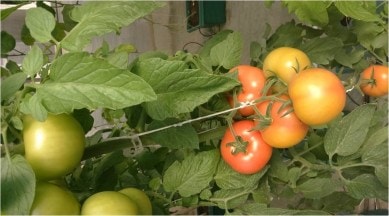
[ad_1]
PAU mentioned in an announcement that at the moment, two main hydroponic methodologies are practiced worldwide.

The Punjab Agricultural University (PAU), Ludhiana, has secured a nationwide patent for its indigenous hybrid hydroponics expertise, marking a big leap in India’s agricultural innovation. The pioneering expertise, coined as the primary “swadeshi” (indigenous) resolution in soilless farming, was developed by Dr VP Sethi, head, division of mechanical engineering, PAU.
The nationwide patent was awarded to PAU for its ingenious enhancement of water and nutrient supply in pot-based substrate hydroponics. It is an amalgamation of two distinct soilless applied sciences.
PAU mentioned in an announcement that at the moment, two main hydroponic methodologies are practiced worldwide. The first includes substrate hydroponics, the place the pot is crammed with soilless root media, predominantly fitted to crops with in depth root techniques like tomatoes, cucumbers, and capsicum. The second method, water tradition, makes use of shallow water ponds for cultivating leafy greens with shallow root techniques. PAU’s modern resolution, referred to as Hybrid Hydroponics Technology (HHT), ingeniously integrates these two approaches into an everyday 12×12-inch pot. This pioneering design options patented modifications, together with a gravity-based water and nutrient restoration system that contributes to cost-effectiveness.
You have exhausted your
month-to-month restrict of free tales.
To proceed studying,
merely register or check in
🌟 Unlock More with an Express Digital Subscription! 🌟 Dive deeper into the tales that matter. Now out there at an unique, limited-time value.
This premium article is free for now.
Register to learn extra free tales and entry gives from companions.
🌟 Unlock More with an Express Digital Subscription! 🌟 Dive deeper into the tales that matter. Now out there at an unique, limited-time value.
This content material is unique for our subscribers.
Subscribe now to get limitless entry to The Indian Express unique and premium tales.
Vice-chancellor Dr SS Gosal elaborated on the transformative potential of the low-cost HHT developed by PAU. Beyond its instant influence on city vertical gardening, the expertise holds promise for large-scale business functions. By repurposing fallow or infertile farmland, the HHT can rework non-arable lands into productive areas for cultivating greens, decorative crops, medicinal herbs, and high-value crops. This innovation presents a singular alternative for each rural and concrete youth, enabling them to endure coaching and set up their very own small-scale ventures from dwelling. With expertise, they’ll scale as much as full-fledged business operations, offering a livelihood for themselves, he opined.
Extending an invite to agritech firms and entrepreneurs, Dr Gosal urged them to have interaction in buying business rights for the “swadeshi” low-cost pot-based HHT. This initiative goals to make the expertise accessible for adoption in rural and concrete settings, for each business manufacturing and home rooftop gardening.
Most Read
Dr Ajmer Singh Dhatt, director of analysis at PAU, shared insights into the rigorous testing of HHT over three years. Crops together with cucumber, tomatoes, cherry tomatoes, and capsicum (inexperienced, yellow, and crimson) had been cultivated, revealing considerably accelerated progress and better yields in comparison with present pot-based and develop bag soilless applied sciences, such because the bato bucket (Dutch expertise) and the non-recirculation develop bag (Israeli expertise).
Highlighting the important thing advantages of the HHT, Dr Dhatt revealed that the improved nutrient availability via a perforated plate on the root’s base, together with elevated oxygen provide, accelerates plant progress. The compact root system permits for nearer plant spacing, optimizing land utilization and probably rising yield per unit space. The HHT’s design results in the environment friendly utilization of water and vitamins, mitigating wastage via leaching, runoff, or evaporation. This facet is essential in gentle of declining water tables and rising soil toxicity, he defined.
Dr Sethi knowledgeable that the PAU’s indigenously developed HHT proves to be 3 times less expensive than imported hydroponic applied sciences, even with out hybridization innovation. The closed-loop water and nutrient restoration system of HHT might probably save 60-80% of water and roughly 50% of vitamins when in comparison with standard polyhouse cultivation with drip irrigation and fertigation strategies. This breakthrough expertise underscores the relevance of sustainable and resource-efficient farming practices, poised to drive transformative change within the agriculture sector.
First revealed on: 21-08-2023 at 20:59 IST
[adinserter block=”4″]
[ad_2]
Source link